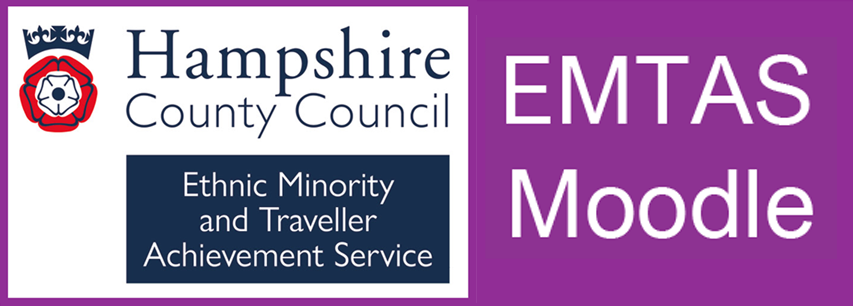Blog entry by Sarah Coles
written by Sarah Coles, Hampshire EMTAS Specialist Teacher Advisor

It is usually clear to staff in schools that there is a
support need they should address when a newly-arrived pupil from overseas
experiences a language barrier on joining their first UK school. This may be the child’s first experience of
being in an English-speaking environment, and there is much to learn in terms
of the new language. What are less
discernible – and perhaps less well-supported - are the other barriers such a
child may face – barriers that relate to differences in pedagogy, social and
cultural differences and of course the sense of dislocation and loss the
newly-arrived child may feel when they first start, having left behind all
their friends and possibly family members too.
Being placed in a situation far outside of their comfort zone, there is
a lot for a new arrival to manage in addition to the demands of having to cope
in a new language.
In the UK, pedagogical
approaches focus on children learning through experience, learning from each
other, learning through trial and error, learning through talk. From an early stage, our indigenous,
monolingual children learn how to learn in these ways and teachers, many
themselves a product of this same system, teach from an often deeply-rooted
belief that these ways are the best. We
are so immersed in the UK classroom culture that as practitioners we may forget
it’s not like this everywhere in the world.
In Poland, for example,
children do not come to sit on the carpet to learn as the carpet is perceived
to be a dirty surface that’s walked on by everyone, so a Polish child – and
possibly also their parents - may look askance when the class is directed to
come to sit there for story time.
In some countries,
children’s behaviour is managed for them,often with a stick should they step
out of line. This means they do not
learn to regulate their own behaviours right from the start of their
educational journeys as UK-born children do.
New arrivals coming from countries where corporal punishment is still
the norm may therefore struggle and fall foul of UK classroom behaviour
management approaches which they do not comprehend, getting themselves into
endless trouble as they struggle to acquire self-regulation skills with little
or no support. One teacher, dealing with
an incident involving a student from overseas who had hit another child, asked
the former “Would it be OK if I hit you?”
To her surprise, the reply came “Well yes, of course it would.” It was the matter-of-factness of the response
that caused her to realise this child really meant what he had said and that
this was not as straightforward an issue as she had at first assumed.
In other parts of the world,
pedagogical approaches may rest on the premise that children are empty buckets,
waiting to be filled with the knowledge possessed by their teachers. While the teacher teaches from the front, the
children sit at their desks in rows, their success measured by how much they
are able to repeat back in the end of year test. There is little scope for learning through
dialogue or for experimenting with ideas and hypotheses to see which ones hold
true under close examination and which do not.
A child coming from that sort of school experience may struggle to
comprehend what is going on in their lessons in their new, UK classroom. How should they engage with their education
when it looks like this? How should they
now behave and function as learners?
Parents may experience their
own difficulties as they grapple with the apparent vagaries of the UK education
system. They may have found applying
online for a school place challenging enough but that was just the start. If they were used to a system wherein their
child was taught from a textbook that came home every night so they could see
what had been covered during the day’s lesson, then how difficult must it be
for them to keep abreast of their child’s learning when there is no text book
to look at? How then should they recap at home the key points covered in class
each day? How might they help prepare their child for the school day
ahead? If they were familiar with
knowing where in the class ranking their child sat, what sense can they make of
our system where we don’t publish information about each child’s attainment in
comparison to their peers? And if in
their country of origin promotion to the next class depended on their child
passing the end-of-year tests, what must it mean to them in our system where
promotion from Year 4 to Year 5 is automatic, regardless of whether or not the
child has met the end-of-year expectations?
An awareness of the far-reaching impact of living in a new culture that goes beyond a nod and accepts that mere survival isn’t really good enough will help practitioners reflect on how they currently support their international new arrivals and what they might be able to put in place to improve current practice. It is of course still good practice to support children to access the curriculum in English through the planned, purposeful use of first language but if we are to look at the bigger picture, then there is more that can be done to help a newly-arrived child to integrate into their new UK school – not least giving thought to what might be the barriers their parents are facing, and what they can do to reduce or remove them.
Sarah Coles
Consultant (EAL) at Hampshire EMTAS
First published on the ATL blog, July 2017
Further reading and resources
http://www3.hants.gov.uk/education/emtas/culturalguidance.htm EMTAS cultural guidance sheets
http://www3.hants.gov.uk/education/emtas/forparents/parentsandcarersguide.htm
behaviour management guides for parents
